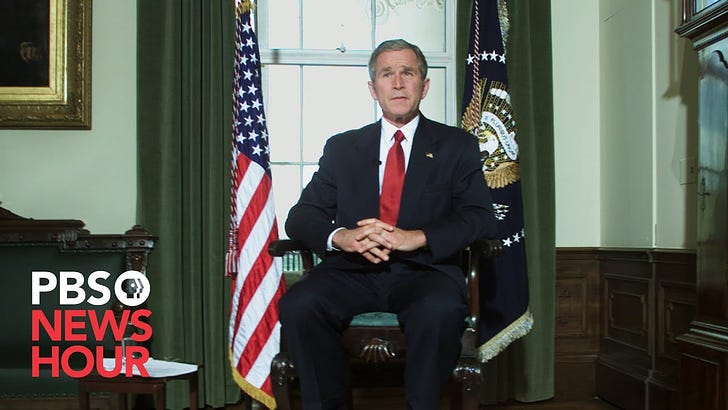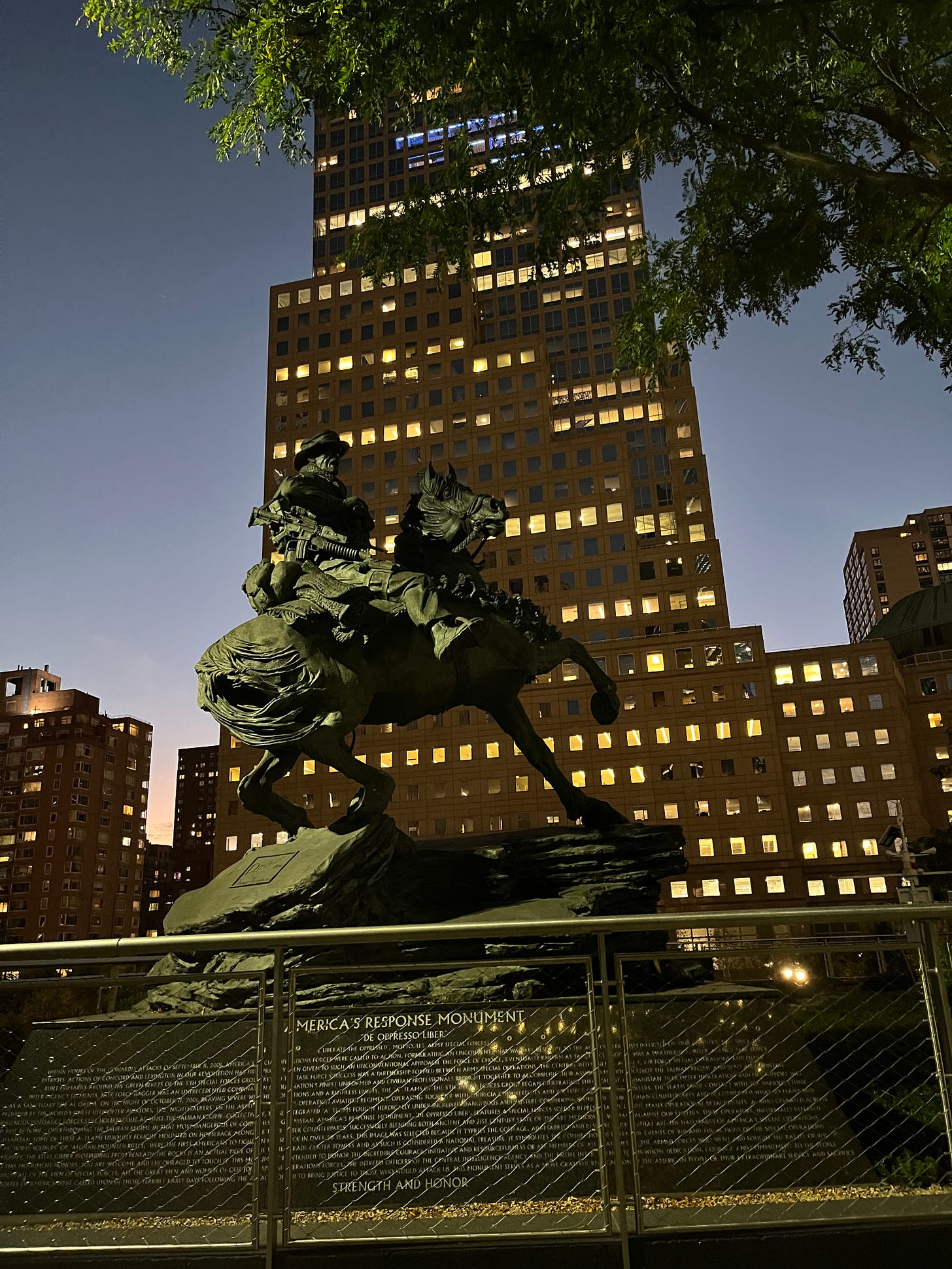23 years ago today, America launched Operation Enduring Freedom (OEF). A Sunday, President George W. Bush took to the airwaves on October 7, 2001 to tell the nation our military had initiated strikes against al Qaeda and the Taliban. “We did not ask for this mission, but we will fulfill it. The name of today's military operation is Enduring Freedom. We defend not only our precious freedoms, but also the freedom of people everywhere to live and raise their children free from fear.”
Source: PBS NewsHour; YouTube.
Over twenty-three years, so much happened. After early successes, progress in Afghanistan came to a halt and the Taliban gained strength, ultimately leading to a surge of American and allied forces in 2010. In 2011 America killed Osama bin Laden, the architect of the 9/11 attacks. (Note: in 2022, after US forces had withdrawn from Afghanistan, America killed Ayman al-Zawahiri, bin Laden’s deputy and one of the other leaders behind 9/11.) From 2011 to 2015, America significantly reduced its footprint, going from over 100,000 personnel to just over 12,000, and formally handed over security responsibilities to the Afghan government. Operation Enduring Freedom officially ended in 2014.
In 2015, the mission in Afghanistan was re-christened Operation Freedom’s Sentinel. In 2020, America signed a peace agreement with the Taliban that committed the US, if the Taliban complied with the provisions of the agreement, to eventually withdraw from the country. In 2021, the Taliban swept through Afghanistan as America withdrew its forces—in August 2021, the Afghan government collapsed and the Taliban took Kabul, the capital city. In a chaotic evacuation, where 13 American service members were killed in a terrorist attack outside Kabul International Airport and tens of thousands of Afghans struggled to escape the country, the last American forces departed on August 30.
This timeline does little to convey the emotional intensity and impact the war had on Americans, our allies, and the Afghan people. It similarly lacks any narrative. Conventional wisdom would suggest the narrative arch of the war in Afghanistan goes something like this: a just and necessary war (2001 to 2003) → the forgotten war (2003-2007) → the “good war” (2008-2014) → the forgotten war again (2014-2020) → another Vietnam (2021+). But I’ll confess, I’m not sure about any of these narratives; I doubt there is a set of coherent narratives most Americans hold about Afghanistan.
Different generations have different stories. Since 2001, More than 80 million Americans have been born. Americans coming age of today likely see OEF and our entire war in Afghanistan so differently from my generation. I had just turned 17 at the start of OEF. My first visit to West Point came in the weeks immediately following the terrorist attacks of 9/11 (the visit had been scheduled many months prior). I served in Afghanistan and lost friends and classmates in the war.
I don’t know what the war meant or means to America. Like so many who served, seeing the Taliban take the country and watching so many Afghans seek so desperately to escape, was one of the most grueling experiences of my life. The pain and loss I had felt with every friend who gave their life in Afghanistan, the guilt I had felt for returning from my tour unscathed, it all came rushing back. Added to this was shame for how our nation left so many of our partners behind. On August 15, 2021, as the Taliban swept through Kabul, I went outside for a walk, feeling like I needed the physical movement to help process all that I was feeling. I’m not sure it helped—walking around lower Manhattan and watching hundreds of New Yorkers out enjoying the city as if it were just another day was perhaps the most distant I have ever felt from this nation I love.
And yet, I am at the same time proud of what we did in Afghanistan. I’m so grateful to have served—I remember the fear and terror of 9/11 and I know what we did made our country safer. Our struggle in Afghanistan was both righteous and just. Describing the war is thus complex. Wars are typically viewed as either victories or defeats. So did we lose the war? I don’t know that binary terms can capture the total experience of Afghanistan. But however you describe the war’s conclusion, how should we remember it? What is the story we should tell?
America’s Response Monument, also known as the Horse Soldier Statue, commemorates the Special Operations soldiers who deployed as part of America’s initial response to 9/11. Source: Author’s Photo.
I suspect that the war means more to our nation than is often assumed but less than someone like me might hope it does. To help answer this question, starting in 2021, I led a series of public opinion projects to ask Americans how they felt about the war. I include them here.
Our understanding of the war will grow as the Afghanistan War Commission continues its work to assess the key decisions our nation made. But it will fall to all of us, as citizens, parents, students, community-members, veterans and non-veterans, to choose to engage with the Commission’s reports, to try and wrestle from the war a greater understanding of what happened, from the halls of power to the most remote of outposts, and what lessons we should take forward with us.
Operation Enduring Freedom and Operation Freedom’s Sentinel, what we know as the Afghanistan War, are over. We may find ourselves in a conflict in the near future, perhaps even in Afghanistan again. Whether we fight that future conflict with greater wisdom, informed by our experiences from 2001 to 2021, is an open-question. It is one one we all should strive to answer.
Additional Resources:
The public opinion research I led—at the time I was leading a research nonprofit called More in Common US—are available here:
https://www.thevci.org/news/after-kabul-attitudes-on-the-end-of-the-war-in-afghanistan
https://www.thevci.org/news/narratives-of-the-afghanistan-war
https://www.thevci.org/news/americans-memories-of-the-afghanistan-war
To learn about ongoing efforts to help America’s Afghan partners, tens of thousands of whom relocated to the US during the withdrawal, please check out #AfghanEvac.
Be Part of Army 250
If you’d like to write a newsletter post, share an educational resource about the Army, or lift up an opportunity for people to connect with the Army (e.g., an event, story, etc.), please contact Dan (dan@army250.us).





